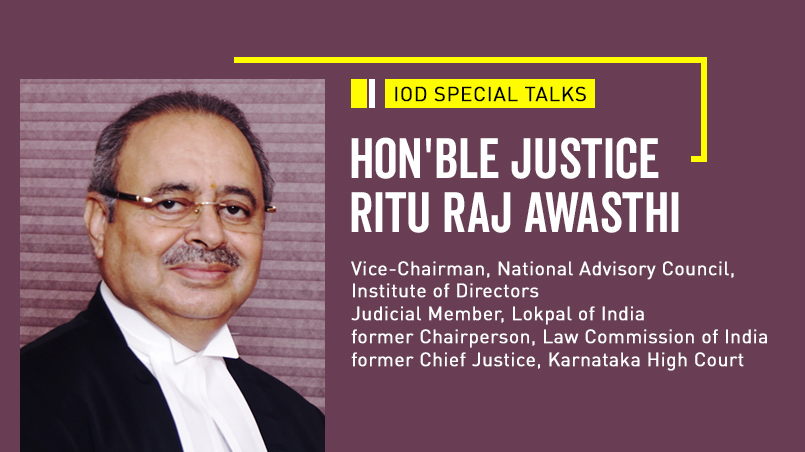 Connect with us
Connect with us

 Aug 05, 2024
Aug 05, 2024
The Intersection of Justice, Ethics, and Climate Responsibility
My dear friends, ladies, and gentlemen, it is indeed a pleasure to speak before you all in this vibrant city of Bengaluru. Bengaluru is a city that embodies innovation, progress, and the spirit of entrepreneurship. Its lush greenery and numerous parks, including the iconic Cubbon Park and Lalbagh Botanical Garden, offer a serene escape from the bustling city life. One of the most remarkable features of Bengaluru is its climate. Unlike many metropolitan areas, Bengaluru enjoys a pleasant and moderate climate throughout the year. This city's weather is not just a comfort for its residents and visitors; it also serves as a gentle reminder of the natural beauty and balance it strives to preserve on our planet.
As we gather here in Bengaluru, a city that thrives on technological advancement and sustainable living, it is fitting that we turn our attention to one of the most pressing issues of our time: addressing climate change and environmental risk. As a judge of the High Court, I have spent much of my career ensuring that justice prevails in our society. Today, I ask you to consider how justice, ethics, and corporate responsibility intersect in the realm of environmental relationships and stewardship.

We stand at a critical juncture. The latest reports from the Intergovernmental Panel on Climate Changes (IPCC) paint a stark picture. Global temperatures are rising at an alarming rate, with the past two decades being the hottest on record. The consequences of elections are no longer theoretical; they are here, affecting communities worldwide, from devastating wildfires in Australia and California to unprecedented flooding in Europe and South Asia. These signs of climate change are evident.
The principle of intergenerational justice demands that we do not deplete resources or degrade the environment at the expense of future generations. As leaders, you have the power and responsibility to ensure that your business operations work in a way that respects this principle.
Just recently, the world witnessed a record-breaking heat wave in parts of the United States and Canada, pushing temperatures to unheard-of levels and causing hundreds of heat-related deaths. Concurrently, we saw catastrophic floods in Germany and Belgium, underscoring the unpredictability and civility of weather events aggravated by climate change. These events serve as a poignant reminder that climate change is not a distant threat but an immediate crisis demanding our immediate attention.
Allow me to share a personal story from a few years ago. My family and I visited a coastal area here in Karnataka. The village was renowned for its pristine beaches and vibrant maritime life. However, when we arrived, we were met with a stark contrast. The once-clear water was littered with plastic waste, and the local fishermen spoke of declining fish populations due to rising sea temperatures. This experience was a wake-up call, highlighting the tangible impact of environmental neglect. Another instance that deeply affected me was during a trip to the Himalayas. I had visited the region as a young man, marveling at the majestic glaciers and snow capped peaks. When I returned decades later, I was shocked to see the extent of glacier retreat. The locals, who had relied on these glaciers for their water supply, now faced a severe water shortage. These experiences underscore the urgent need for collective action to address environmental risk. The industries, and more particularly, the boardrooms, play a pivotal role in this global challenge.
The Institute of Directors has played a crucial role in shaping the corporate landscape in India. Their leadership and vision in organising this conference underscore the importance of addressing climate change and environmental risk.
Our operations, supply chain, and spending contribute to making us both contributors and potential mitigators of climate change. The choices you make today will shape the world of tomorrow. Many companies have already taken commendable steps towards sustainability. However, the journey is not far from over. Embracing renewable energy sources, improving energy efficiency, and reducing carbon footprints are not just environmentally responsible actions but also economically prudent.
One study shows that sustainable business practices can lead to significant cost savings, improved brand loyalty, and resilience against regulatory changes. Innovation is at the heart of addressing climate change. Investing in green technologies, such as electric and hybrid vehicles, sustainable agriculture, carbon capture, and storage, can drive significant progress. The recent advancements in battery technology and renewal energy storage offer promising avenues to reduce dependency on fossil fuels. By supporting research and development in these areas, you can lead the way in creating a sustainable future.
Transparency is crucial to building trust, ensuring accountability, and adopting comprehensive environmental, social, and governance policies. Reporting standards allow stakeholders to track your progress and hold you accountable. For more, aligning your goals with international frameworks, such as the Paris Agreement, sends a strong signal of commitment to global efforts to combat climate change. From a legal perspective, the tide is turning increasingly. Courts worldwide are recognising the imperative to protect the environment.
In a landmark ruling last year, the Dutch Court ordered Royal Dutch Shell to cut its CO emissions to 45% by 2013 2 compared to 2019 levels. This decision sets precedent, illustrating that corporations can be held legally accountable for their contributions to climate change.
Ethically, the argument is even more compelling. The principle of intergenerational justice demands that we do not deplete resources or degrade the environment at the expense of future generations. As leaders, you have the power and responsibility to ensure that your business operations work in a way that respects this principle.
Addressing climate change requires unprecedented levels of collaboration. Governments, corporations, nonprofits, and individuals must work together to create meaningful change. As directors of individual companies, your leadership is critical. You have the resources, reach, and innovation capacity to drive significant environmental improvements. Moreover, fostering partnerships with other organisations, governments, and communities can amplify your impact. Collaborative initiatives such as the Race to Zero Campaign unite businesses, cities, and regions in a collective effort to achieve net zero carbon emissions in 2050.
I would like to take a moment to extend my deepest appreciation to the Institute of Directors. Their timeless efforts in promoting good governance, corporate ethics, and sustainability are commendable for bringing environmental issues to the mainstream. They have played a crucial role in shaping the corporate landscape in India. Their leadership and vision in organising this conference underscore the importance of addressing climate change and environmental risk. This year, the Golden Peacock Award has been organised for environmental management, energy efficiency, occupational health and safety, as well as for eco innovations.
In conclusion, the challenge of climate change is daunting, but it is not insurmountable. By integrating sustainable practices, leveraging innovation, ensuring transparency, and embracing your legal and ethical responsibilities, you can lead the way towards a more sustainable and equitable future.
The world is watching your actions to determine the legacy you leave behind. Let us seize this opportunity. Do not only save our planet, but inspire future generations with our commitment and resolve.
Thank you.

Excerpts from the 'Guest of Honour Address' delivered by Hon'ble Justice Ritu Raj Awasthi, Vice Chairman, National Advisory Council, Institute of Directors, former Chief Justice, Karnataka High Court at the 'Inaugural Session' of th the 25 International Conference on Environment Management and Climate Change, held on June 27, 2024 in Hotel The Lalit Ashok, Bengaluru.
Owned by: Institute of Directors, India
Disclaimer: The opinions expressed in the articles/ stories are the personal opinions of the author. IOD/ Editor is not responsible for the accuracy, completeness, suitability, or validity of any information in those articles. The information, facts or opinions expressed in the articles/ speeches do not reflect the views of IOD/ Editor and IOD/ Editor does not assume any responsibility or liability for the same.
About Publisher

Bringing a Silent Revolution through the Boardroom
Institute of Directors (IOD) is an apex national association of Corporate Directors under the India's 'Societies Registration Act XXI of 1860'. Currently it is associated with over 30,000 senior executives from Govt, PSU and Private organizations of India and abroad.
View All BlogsMasterclass for Directors
Categories